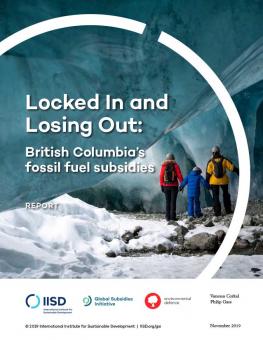
Locked In and Losing Out: British Columbia’s fossil fuel subsidies
British Columbia's fossil fuel subsidies reached CAD 830 million in 2017–2018, and new subsidies continue to be introduced. This report identifies provincial subsidies and calls on the province to undertake subsidy reform.
-
#BC’s fossil fuel subsidies reached CAD 830 million in 2017–2018. New subsidies continue to be created, including significant support for the liquefied natural gas (LNG) industry.
-
#BC's provincial fossil fuel subsidies undermine the CleanBC plan introduced by the government in 2018 and hold the province back from meeting its #GHG emissions reductions targets.
-
#BC is on the front lines of #climate change, experiencing the impacts of coastal erosion, sea level rise, and record-breaking wildfires. Fossil fuel subsidy reform must be a part of BC's climate efforts.
Key Messages
- BC’s fossil fuel subsidies reached CAD 830 million in 2017–2018. New subsidies continue to be created, including significant support for the liquefied natural gas (LNG) industry.
- Provincial fossil fuel subsidies undermine the CleanBC plan introduced by the government in 2018 and hold the province back from meeting its targets for greenhouse gas emissions reductions.
- This IISD report calls on British Columbia to phase out fossil fuel subsidies and ensure policy coherence to maximize climate action.
British Columbia (BC), which has a reputation as the most environmentally friendly Canadian province, is in fact one of the nation’s biggest supporters of the fossil fuel industry. Each year, the province provides hundreds of millions of dollars in subsidies for fossil fuels.
The majority of BC's fossil fuel subsidies go to fossil fuel producers, with hundreds of millions provided each year in royalty credits. Since not all royalty credits are used in the year they are granted, the province has amassed at least CAD 2.6 billion to CAD 3.1 billion in outstanding royalty credits from fossil fuel producers.
BC is also providing significant support for the liquefied natural gas (LNG) industry. The new BC-LNG Canada Agreement is just one example of support that serves to lock in high-carbon investments at the expense of sustainable energy alternatives.
BC is on the front lines of climate change. The past few years have been record years for wildfires, and the province is already seeing the impacts of coastal erosion and sea level rise. Though the province has introduced policies such as the CleanBC plan and carbon pricing regime, fossil fuel subsidy reform must be part and parcel of BC's efforts to address climate change.
Participating experts
Additional downloads
Funded by
You might also be interested in
Green Strings: Principles and conditions for a green recovery from COVID-19 in Canada
Endorsed by Canada's leading environmental groups, this paper sets out seven "green strings" recommendations to apply to government measures to ensure a green recovery from COVID-19.
Who Will Pay for Alberta's Orphan Wells?
Alberta's orphan wells require proper decommissioning to prevent harm to the environment and surrounding communities. Who will pay for this?
Doubling Down on Alberta's Oil and Gas Sector Is a Risk Canadians Can’t Afford to Take
There's no question that people across Alberta need urgent help. But is injecting tens of billions into oil and gas corporations the right kind of help?
G20 Governments Commit USD 151 Billion to Fossil Fuels in COVID-19 Recovery
EnergyPolicyTracker.org, a new website tracking climate- and energy-related recovery policies, shows at least USD 151 billion from G20 governments in support of fossil fuels.